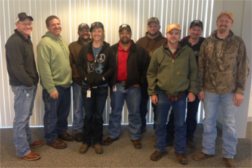Home » safety professionals
Articles Tagged with ''safety professionals''
Nominations now being accepted for the NSC Rising Stars of Safety, Class of 2014
Annual National Safety Council recognition of the next generation of safety leaders
April 15, 2014
Become a Leader in Safety Culture
Build your knowledge with ISHN, covering key safety, health and industrial hygiene news, products, and trends.
JOIN TODAYCopyright ©2025. All Rights Reserved BNP Media.
Design, CMS, Hosting & Web Development :: ePublishing








